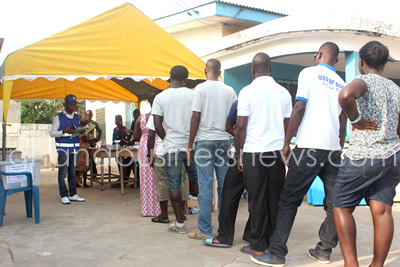Cameroon’s presidential poll unfolds amid regional tensions
 Cameroon’s presidential election unfolded here early Sunday amid despite domestic tensions between some separatists in the western region and government forces.
Cameroon’s presidential election unfolded here early Sunday amid despite domestic tensions between some separatists in the western region and government forces.
The African Union (AU) observation mission expressed satisfaction with the polling process.
There are over 6.6 million voters registered for the poll. President Paul Biya of the ruling Cameroon People’s Democratic Movement (CPDM) who seeks to extend his 36 years in office by winning a new seven-year mandate cast his ballot at a local polling station.
“We will win the election … a vote for Paul Biya is a vote for the unity and prosperity of the country. He is the most experienced candidate to solve the problems of our country,” CPDM member Essomba Jean said.
Joshua Osih of the Social Democratic Front (SDF), the leading opposition candidate, also cast his ballot at Lycee Joss polling station in Douala, the country’s economic capital.
“Throughout this campaign we have presented a program for peace, stability and wealth for our country. I will do this for Cameroon. Tomorrow, Sunday, vote for change. We will win the election,” Osih told supporters at a Saturday rally.
Prior to the Sunday vote, one of the opposition candidates, Akere Muna of the People’s Development Front, decided to withdraw his candidacy in the election for the benefit of Maurice Kamto, whom he urged his supporters to vote for.
“Only a union of forces of the main candidates can overcome the Biya regime,” Muna said, who announced a coalition with Kamto of the Cameroon Renaissance Movement in less than 48 hours to the polling day.
The voting was not an easy one in the two Anglophone regions of the Southwest and Northwest as armed separatist forces there are fighting to create a new nation called “Ambazonia.”
In those regions, “most of the polling stations are not functioning because there are no voters yet. Officials are still trying to vote in some polling stations that are heavily guarded by government forces,” Derick Jato, a local journalist, told Xinhua from Buea, Southwest region.
Two armed separatists who tried to disrupt the vote were killed by government forces, Northwest’s governor Adolphe Lele Lafrique said.
Despite the regional tension, the AU said Sunday it was “satisfied” with the polling process.
“We can agree that it (the voting) went well and we are satisfied,” Kwesi Ahoomey-Zunu, head of the AU observation mission for the election, told reporters.
“I do not have an exact evaluation of how things unfolded but by information I obtained, we can say the situation was not too good (in the anglophone regions). In spite of that, I think my appraisal is positive,” Ahoomey-Zunu said.
Before the vote, the ruling party CPDM and the leading opposition SDF urged their supporters to maintain peace to ensure the polls are held in a peaceful environment.
“This election is not about the candidate. What matters most for this election is what the future holds for the country considering the war going on in the country,” Osih said after voting, indicating the significance of this vote as a fate-deciding moment for the West African country.
According to the electoral code, the results will be proclaimed by the Constitutional Council within no more than 15 days of the close of the poll.
Source: GNA
